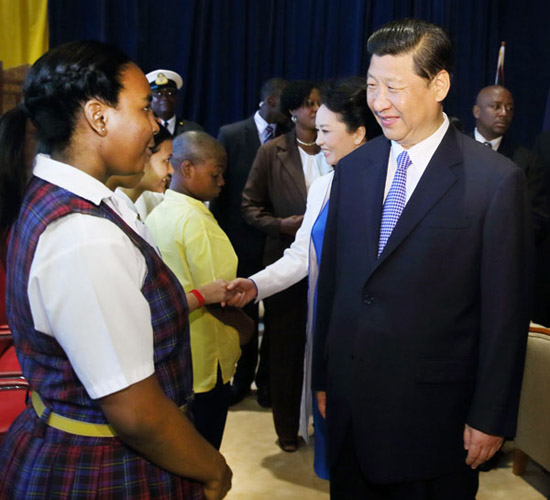
 |
| President Xi Jinping and his wife Peng Liyuan meet student representatives at Port of Spain during their visit to Trinidad and Tobago on Saturday. Lan Hongguang / Xinhua |
China wishes to diversify its relationship with Caribbean region
China has strengthened ties with the Latin American region as President Xi Jinping harvested political consensus and cooperation pacts during his visit.
Observers said Beijing and the countries in the region want to put greater diversity into the relationship to seek the greatest benefit for emerging economies across the Pacific.
"Trinidad and Tobago is the first Caribbean country that I visited after taking office as Chinese president. It is also the first stop of my journey to Latin America and the Caribbean this time," Xi said while meeting his Trinidad and Tobago counterpart Anthony Carmona on Saturday morning.
"My visit is to consolidate the friendship and cooperation between the two countries and carry bilateral relations further forward," Xi said.
On Saturday, China and Trinidad and Tobago signed three cooperation documents: an agreement on economic and technical cooperation, a supplementary exchange of letters on the provision of container scanners to Trinidad and Tobago, and an agreement on the establishment of a Confucius Institute at the University of West Indies.
Wu Changsheng, a researcher of Latin American studies at the China Foundation for International Studies, said the pragmatic cooperation between the two countries "is not just a joint venture in energy and resources sectors, and the cooperation enjoys a strong momentum in diversity".
"As for the two emerging economies, new attention has been shown in tourism and green energy," Wu said.
Xi's visit to Caribbean region countries shows the "comprehensive geopolitical consideration" on diplomacy by the new Chinese leadership, Wu said.
During a meeting with Kamla Persad-Bissessar, prime minister of Trinidad and Tobago, Xi said the country is one of China's most important partners in the Caribbean region and there is huge potential for cooperation.
They agreed to cooperate in infrastructure construction, energy and mineral resources, and strive for collaboration in new areas such as agriculture, fishing, technology, finance, telecommunication and new energy.
The leaders also agreed to intensify personnel exchanges, particularly among youth from the two countries, and conduct more cultural and tourism events.
"Given the concerns of the regional countries about being marginalized as energy providers, Beijing has taken great effort in diversifying all-around collaboration with them," said Chen Yuanting, a Latin American expert at the Chinese Academy of Social Sciences.
Latin America and the Caribbean region have strong economic momentum and are seeking political independence and greater say in the global arena, which resonates with China's diplomatic pursuits, Chen said.
Xi said China fully understands the concerns of island countries about climate change, and it has been supportive of the legitimate demands of island countries in international negotiation. China is willing to provide some energy-efficient products to the Caribbean countries to help them improve the capability to respond to climate change.


















 Kids in quake-hit Lushan mark children's day in makeshift houses
Kids in quake-hit Lushan mark children's day in makeshift houses


![]()
